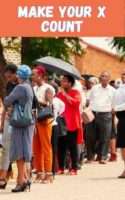Both my younger sister and my nephew, who are in high school, are potential first-time voters for the upcoming national general elections in 2024, “I am not into politics!” was my nephew’s response when I asked him if he would be voting next year. My sister is equally uninterested, and sadly, this is an attitude many young people hold in this country. A declining voter turnout is a disappointingly clear evidence of where we are headed. Given the history of how democracy was attained through the liberation movement, one would expect no room for the lack of participation.
But can we characterise this as being apolitical? Not quite. Political decisions are the highest form of decisions; therefore, they are bound to affect whether you care to show interest. It is not that the youth is not into politics. We often come across posts on social media about how we do not seem angry enough as a call for action against the state of leadership in our country. Over the last couple of years, we have seen a rise in social movements led by the youth, like the #RhodesMustFall and #FeesMustFall. There is also heated discourse on the national shutdown planned by the Economic Freedom Fighters for the 20th of March.
The youth is the most crucial demographic in South Africa and the fastest growing in Africa. Approximately 20.4 million or 63.3% of the population comprises individuals in the 15-34 age category, Stats SA in 2020. The youth are also the most vulnerable and affected by the many social ills this country is grappling with. The disgruntlement, an understatement, is a major factor contributing to voter apathy.
According to the Quarterly Labour Force Survey (QLFS) for the first quarter of 2022, the unemployment rate was 63,9% for those aged 15-24 and 42,1% for those aged 25-34 years( Stats SA, 2022). Young people bear the brunt and are justifiable in how they best express themselves. However, has it yielded the result we desire?
Choosing NOT to vote is everyone’s democratic right they are entitled to, but who gets to continue to carry this burden of a government that is failing so many people? One of the best forms of expressing the frustration afforded by democracy is heading to the polls and making that important X. The elections in 1994 were life-changing for so many and signified a major shift.
We are a country privileged with democratic elections that are not identified by violence and intimidation but are free and fair to express ourselves and participate. And the beauty of access to elections is that it is not restricted by class, geographic area, race, gender or creed. Active participation in elections by the youth would also encourage influence, representation and accountability; we are in dire need of the voice of young people in the decision-making structures to match the demographics.
With more young people gaining access to the internet, the Independent Electoral Commission’s move to online registration is worth noting and progressive. There is also room for improvement in making the site more mobile-friendly and, if possible, free to use. But the internet is only a small portion of the larger population, the IEC has the responsibility to do better with regard to political education as well, especially in schools and not only during election season.
Right now, do we really need another protest? Voting wisely holds the potential to effect change. Let us take our grievances up to the ballots instead of just hashtags and trending topics. A famous Turkish proverb goes, “The forest was shrinking, but the trees kept voting for the axe, for the axe was clever and convinced the trees that because his handle was made of wood, he was one of them.” The current and most enthusiastic voters are our elders, who do so out of loyalty and fear because of the previous era they endured.
The numbers and the power lie in my nephew and sister and their interest in political matters.
Tell us: How do you view voting in the upcoming election as a young person? What do you think about having a say in political decisions that impact your future?
If you enjoyed this article, read Malaika Wa Azania’s article Why your vote matters here.



